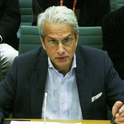Celebrities, politicians and members of the royal family. All had their phones tapped. But it wasn’t the state behind the violation; it was the British tabloid press. The reason? Money and sensationalism. To sell copies. To achieve journalistic success by violating basic journalistic ethics.
The phone-hacking scandal rocked the British press 15 years ago. It led to a newspaper closure, prison sentences and legal settlements now totalling more than £1bn. And this is far from ancient history. A few days ago, it became clear that the ripple effects have reached the US and swept over one of the world’s most important newspapers, the Washington Post.
The paper’s CEO, Will Lewis, is a former Murdoch executive. During the spring, it was alleged in a British court that in one of these previous roles, he was involved in deleting millions of emails and did not tell the truth to the police.
Several media outlets, including the Washington Post, have reported on these allegations. Lewis—who denies the allegations—has not appreciated the attention. There are reports that he tried to stop his own paper’s coverage of the matter by pressuring executive editor Sally Buzbee.
There is reason to take these reports seriously, as Lewis suddenly announced on the evening of Sunday 2nd that Buzbee is leaving the Washington Post after only a few years in the position. She is being replaced by a couple of former colleagues of Lewis’s.
Someone might think this is an internal industry issue, of little general interest. In any part of society, it would be poor leadership to bring in old male friends to replace a qualified chief, who also happens to be the first female executive editor in the organisation’s nearly 150-year history.
It is bad. But the issue is even bigger than that.
There is a presidential election in the US, and since he entered American politics, Donald Trump has waged a war against independent and truth-seeking journalism. The free press is under attack and simultaneously plays a more crucial role than ever.
This is especially true for the Washington Post, the paper that with its fearless journalism brought down the lying and authoritarian President Nixon. Over the years, its leaders have prided themselves on being loyal to only one group—the citizens—regardless of the pressures exerted by economic and political power. “Democracy Dies in Darkness” was unveiled as its new motto in 2017 and spoke to the paper’s core beliefs during the Trump years.
Lewis denies that he tried to improperly influence the reporting on himself. But when he responds to the claims, which are deemed credible enough to be published in both the New York Times and the Washington Post, he dismisses them by sarcastically labelling a prominent media reporter at NPR as “an activist, not a journalist.”
All of this shows that Lewis lacks fundamental respect for the journalistic mission, despite cutting his journalistic teeth as a successful reporter at the Financial Times. The Murdoch organisation, in which Lewis built his career as a media executive, has a different culture, where money, politics and journalism have, in some cases, been mixed into a toxic brew.
Are there similar ambitions at the Washington Post? Is that why the old gang is being called in? There is no evidence for this, but the fact that the question is being asked by serious observers during one of the most dramatic presidential elections in US history is bad enough.
Lewis believes that the Washington Post is in crisis. Last year, the paper lost $77m and it has reportedly lost half its readers since 2020. That is supposedly the reason why the CEO is changing chiefs and also splitting the newsroom into separate parts.
There are different opinions on what constitutes a wise business strategy. But the paper’s significant losses are also due to decisions taken by Amazon founder and one of the world’s richest men, Jeff Bezos, who has owned the paper since 2013. He allowed the paper to make big investments to gain market share.
It initially went well, but after the pandemic, readers’ interest in news declined—most media outlets in the western world have experienced this, not just the Washington Post. For Bezos, the paper’s losses do not significantly affect his wealth. He may have grown tired of paying for the party as successes have waned, but serious media ownership requires perseverance. You are not selling just any product but something that fulfils a central function in democracy.
A newspaper company must have its numbers in order. But it also deserves leadership that respects the letters. Even words that might not be desired must be allowed to be expressed.
Few people in the world can match Bezos financially. If he has grown tired of the value of free journalism, it is a very ominous sign of the times.












